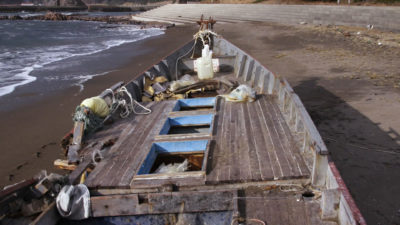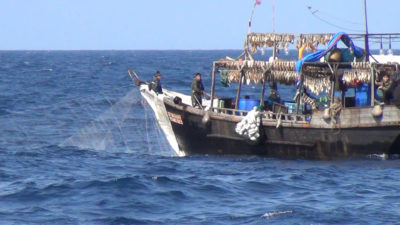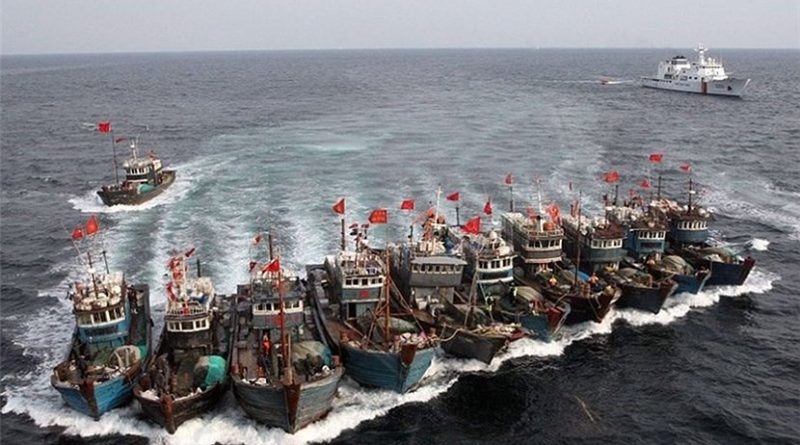World's largest fishing fleet taking all fish from ocean.
https://e360.yale.edu/features/how-chinas-expanding-fishing-fleet-is-depleting-worlds-oceans
How China’s Expanding Fishing Fleet Is Depleting the World’s Oceans
After exhausting areas close to home, China’s vast fishing fleet has moved into the waters of other nations, depleting fish stocks. More than seafood is at stake, as China looks to assert itself on the seas and further its geo-political ambitions, from East Asia to Latin America.
BY IAN URBINA • AUGUST 17, 2020
For years, no one knew why dozens of battered wooden “ghost boats” — often along with corpses of North Korean fishermen whose starved bodies were reduced to skeletons — were routinely washing ashore along the coast of Japan.
A recent investigation I did for NBC News, based on new satellite data, has revealed, however, what marine researchers now say is the most likely explanation: China is sending a previously invisible armada of industrial boats to illegally fish in North Korean waters, forcing out smaller North Korean boats and leading to a decline in once-abundant squid stocks of more than 70 percent. The North Korean fishermen washing up in Japan apparently ventured too far from shore in a vain search for squid and perished.
The Chinese vessels — more than 700 of them last year — appear to be in violation of United Nations sanctions that prohibit foreign fishing in North Korean waters. The sanctions, imposed in 2017 in response to the country’s nuclear tests, were aimed at punishing North Korea by not allowing it to sell fishing rights in its waters in exchange for valuable foreign currency.
The new revelations cast new light on the dire lack of governance of the world’s oceans and raise thorny questions about the consequences of China’s ever-expanding role at sea and how it is connected to the nation’s geopolitical aspirations.
China is not only the world’s biggest seafood exporter, the country’s population also accounts for more than a third of all fish consumption worldwide. Having depleted the seas close to home, the Chinese fishing fleet has been sailing farther afield in recent years to exploit the waters of other countries, including those in West Africa and Latin America, where enforcement tends to be weaker as local governments lack the resources or inclination to police their waters. Most Chinese distant-water ships are so large that they scoop up as many fish in one week as local boats from Senegal or Mexico might catch in a year.
Many of the Chinese ships combing Latin American waters target forage fish, which are ground into fishmeal, a protein-rich pelletized supplement fed to aquaculture fish. The Chinese fleet has also focused on shrimp and now endangered totoaba fish, which are much prized in Asia for the alleged medicinal properties of their bladders, which can sell for between $1,400 and $4,000 each.

A North Korean ghost boat washed ashore along the coast of Japan. FÁBIO NASCIMENTO
Nowhere at sea is China more dominant than in squid fishing, as the country’s fleet accounts for 50 to 70 percent of the squid caught in international waters, effectively controlling the global supply of the popular seafood. At least half of the squid landed by Chinese fishermen pulled from the high seas is exported to Europe, north Asia and the United States.
To catch squid, the Chinese typically use trawling nets stretched between two vessels, a practice widely criticized by conservationists because it results in a lot of fish inadvertently and wastefully killed. Critics also accuse China of keeping high-quality squid for domestic consumption and exporting lower-quality products at higher prices. In addition, critics say, China overwhelms vessels from other countries in major squid breeding grounds and is in a position to influence international negotiations about conservation and distribution of global squid resources for its own interests.
China’s global fishing fleet did not grow into a modern behemoth on its own. The government has robustly subsidized the industry, spending billions of yuan annually. Chinese boats can travel so far partly because of a tenfold increase in diesel fuel subsidies between 2006 and 2011 (Beijing stopped releasing statistics after 2011, according to a Greenpeace study).
For over a decade, the Chinese government has helped pay to construct bigger, more advanced steel-hulled trawlers, even sending medical ships to fishing grounds to enable the fleet to stay at sea longer. The Chinese government supports the squid fleet in particular by providing it with an informational forecast of where to find the most lucrative squid stocks, using data gleaned from satellites and research vessels.
Still, China is hardly the worst offender when it comes to such subsidies, which conservationists say, along with over-capacity of fishing vessels and illegal fishing, is a major reason that the oceans are rapidly running out of fish.

ALSO ON YALE E360
A global ban on fishing on the high seas? The time is now. Read more.
More recently, the Chinese government has stopped calling for an expansion of its distant-water fishing fleet and released a five-year plan in 2017 that restricts the total number of offshore fishing vessels to under 3,000 by 2021. Daniel Pauly, a marine biologist and principal investigator for The Sea Around Us Project at The University of British Columbia, said he believes that the Chinese government is serious in wanting to restrict its distant-water fleet. “Whether they can enforce the planned restrictions onto their fleet is another question,” he added.

A Chinese squid vessel flying the South Korean flag while fishing at night. SOUTH KOREAN FISHERIES AGENCY / ULLEUNG ISLAND
Other attempts to rein in China’s fishing fleet, however, have been slow. Imposing reforms and policing them is difficult partly because laws are lax, much of the workforce on vessels is illiterate, many ships are unlicensed or lack unique names or the identifying numbers needed for tracking, and the country’s fishery research institutions often refuse to standardize or share information domestically or abroad.
Still, more than seafood is at stake in the present size and ambition of China’s fishing fleet. Against the backdrop of China’s larger geo-political aspirations, the country’s commercial fishermen often serve as de-facto paramilitary personnel whose activities the Chinese government can frame as private actions. Under a civilian guise, this ostensibly private armada helps assert territorial domination, especially pushing back fishermen or governments that challenge China’s sovereignty claims that encompass nearly all of the South China Sea.
“What China is doing is putting both hands behind its back and using its big belly to push you out, to dare you to hit first,” said Huang Jing, former director of the Center on Asia and Globalization at the Lee Kuan Yew School of Public Policy in Singapore.
Chinese fishing boats are notoriously aggressive and often shadowed, even on the high seas or in other countries’ national waters, by armed Chinese Coast Guard vessels. While reporting at sea, my photographer and I filmed 10 illegal Chinese squid ships crossing into North Korean waters. Our reporting team was forced to divert its course to avoid a dangerous collision after one of the Chinese fishing captains suddenly swerved toward the team’s boat, coming within 10 meters, likely intending to ward off the boat.
But the more aggressive and ubiquitous blue-water presence globally is China’s fishing fleet. These vessels are routinely cast by Western military analysts as a vanguard “civilian militia” that functions as “a nonuniformed, unprofessional force without proper training and outside of the frameworks of international maritime law, the military rules of engagement, or the multilateral mechanisms set up to prevent unsafe incidents at sea,” as Greg Poling wrote recently in Foreign Policy.
Nowhere is China’s fishing fleet more omnipresent than in the South China Sea, which is among the most hotly contested regions in the world, with competing historical, territorial and even moral claims from China, Vietnam, Philippines, Malaysia, Brunei, Taiwan, and Indonesia. Aside from fishing rights, the interests in these waters stem from a tangled morass of national pride, lucrative subsea oil and gas deposits, and a political desire for control over a region through which a third of the world’s maritime trade flows.
In the South China Sea, the Spratly islands have attracted most attention as the Chinese government has built artificial islands on reefs and shoals in these waters, militarizing them with aircraft strips, harbors, and radar facilities. Chinese fishing boats bolster the effort by swarming the zone, crowding and intimidating potential competitors, as they did in 2018, suddenly dispatching more than 90 fishing ships to drop anchor within several miles of Philippines-held Thitu Island immediately after the Philippine government began modest upgrades on the island’s infrastructure.

South Korean squid fisherman, shown here in the East Sea of Japan, are being forced to fish farther off their own coast by the influx of Chinese vessels. SOUTH KOREAN FISHERIES AGENCY / ULLEUNG ISLAND
In justifying its rights over the region, Beijing usually makes a so-called “nine-dash line” argument, which relies on maps of historic fishing grounds that feature a line made of nine dashes encompassing most of the South China Sea as belonging to China. Partly because China ignores most of the criticism, and partly because China is economically and otherwise dominant on the global stage, there is a tendency in Western media to lay blame on China for many of the same actions of which the U.S. and Europe have been guilty — in the past or presently. And while defining what is true or fair in the South China Sea may be no easier than it has proven to be in places like the Middle East, most legal scholars and historians say the nine-dash line argument has no basis under international law, and it was found to be invalid in a 2016 international court ruling.
Clashes over fishing grounds involving the Chinese are not limited to the South China Sea. Japan and China are at odds over the Senkaku Islands, known in Chinese as the Diaoyu or “fishing” islands. Elsewhere, an Argentine Coast Guard vessel fired a warning shot to halt a Chinese ship’s escape to international waters in March, 2016. When the Chinese ship, the Lu Yan Yuan Yu, responded by trying to ram the Argentine vessel, the Coast Guard ship capsized the fishing vessel. Some of the Chinese crew escaped by swimming out to other Chinese vessels, while others were rescued by the Coast Guard.

ALSO ON YALE E360
Lawless Ocean: The link between human rights abuses and overfishing. Read more.
From the waters of North Korea to Mexico to Indonesia, incursions by Chinese fishing ships are becoming more frequent, brazen and aggressive. It hardly takes a great feat of imagination to picture how a seemingly civilian clash could rapidly escalate into a bigger military conflict. Such confrontations also raise humanitarian concerns about fishermen becoming collateral damage, and environmental questions about the government policies accelerating ocean depletion. But above all, the reach and repercussions of China’s at-sea ambitions highlight anew that the real price of fish is rarely what appears on the menu.
This article was produced in collaboration between The Outlaw Ocean Project and Yale Environment 360.
https://e360.yale.edu/features/how-chinas-expanding-fishing-fleet-is-depleting-worlds-oceans
How China’s Expanding Fishing Fleet Is Depleting the World’s Oceans
After exhausting areas close to home, China’s vast fishing fleet has moved into the waters of other nations, depleting fish stocks. More than seafood is at stake, as China looks to assert itself on the seas and further its geo-political ambitions, from East Asia to Latin America.
BY IAN URBINA • AUGUST 17, 2020
For years, no one knew why dozens of battered wooden “ghost boats” — often along with corpses of North Korean fishermen whose starved bodies were reduced to skeletons — were routinely washing ashore along the coast of Japan.
A recent investigation I did for NBC News, based on new satellite data, has revealed, however, what marine researchers now say is the most likely explanation: China is sending a previously invisible armada of industrial boats to illegally fish in North Korean waters, forcing out smaller North Korean boats and leading to a decline in once-abundant squid stocks of more than 70 percent. The North Korean fishermen washing up in Japan apparently ventured too far from shore in a vain search for squid and perished.
The Chinese vessels — more than 700 of them last year — appear to be in violation of United Nations sanctions that prohibit foreign fishing in North Korean waters. The sanctions, imposed in 2017 in response to the country’s nuclear tests, were aimed at punishing North Korea by not allowing it to sell fishing rights in its waters in exchange for valuable foreign currency.
The new revelations cast new light on the dire lack of governance of the world’s oceans and raise thorny questions about the consequences of China’s ever-expanding role at sea and how it is connected to the nation’s geopolitical aspirations.
Estimates of the total size of China’s global fishing fleet vary widely. By some calculations, China has anywhere from 200,000 to 800,000 fishing boats, accounting for nearly half of the world’s fishing activity. The Chinese government says its distant-water fishing fleet, or those vessels that travel far from China’s coast, numbers roughly 2,600, but other research, such as this study by the Overseas Development Institute (ODI), puts this number closer to 17,000, with many of these ships being invisible like those that satellite data discovered in North Korean waters. By comparison, the United States’ distant water fishing fleet has fewer than 300 vessels.Most Chinese ships are so large that they scoop up as many fish in a week as a local boat might catch in a year.
China is not only the world’s biggest seafood exporter, the country’s population also accounts for more than a third of all fish consumption worldwide. Having depleted the seas close to home, the Chinese fishing fleet has been sailing farther afield in recent years to exploit the waters of other countries, including those in West Africa and Latin America, where enforcement tends to be weaker as local governments lack the resources or inclination to police their waters. Most Chinese distant-water ships are so large that they scoop up as many fish in one week as local boats from Senegal or Mexico might catch in a year.
Many of the Chinese ships combing Latin American waters target forage fish, which are ground into fishmeal, a protein-rich pelletized supplement fed to aquaculture fish. The Chinese fleet has also focused on shrimp and now endangered totoaba fish, which are much prized in Asia for the alleged medicinal properties of their bladders, which can sell for between $1,400 and $4,000 each.

A North Korean ghost boat washed ashore along the coast of Japan. FÁBIO NASCIMENTO
Nowhere at sea is China more dominant than in squid fishing, as the country’s fleet accounts for 50 to 70 percent of the squid caught in international waters, effectively controlling the global supply of the popular seafood. At least half of the squid landed by Chinese fishermen pulled from the high seas is exported to Europe, north Asia and the United States.
To catch squid, the Chinese typically use trawling nets stretched between two vessels, a practice widely criticized by conservationists because it results in a lot of fish inadvertently and wastefully killed. Critics also accuse China of keeping high-quality squid for domestic consumption and exporting lower-quality products at higher prices. In addition, critics say, China overwhelms vessels from other countries in major squid breeding grounds and is in a position to influence international negotiations about conservation and distribution of global squid resources for its own interests.
China’s global fishing fleet did not grow into a modern behemoth on its own. The government has robustly subsidized the industry, spending billions of yuan annually. Chinese boats can travel so far partly because of a tenfold increase in diesel fuel subsidies between 2006 and 2011 (Beijing stopped releasing statistics after 2011, according to a Greenpeace study).
For over a decade, the Chinese government has helped pay to construct bigger, more advanced steel-hulled trawlers, even sending medical ships to fishing grounds to enable the fleet to stay at sea longer. The Chinese government supports the squid fleet in particular by providing it with an informational forecast of where to find the most lucrative squid stocks, using data gleaned from satellites and research vessels.
On its own, distant-water squid fishing is a money-losing business, according to research by Enric Sala, founder and leader of the National Geographic Society’s Pristine Seas project. The sale price of squid typically does not come close to covering the cost of the fuel required to catch the fish, Sala found.Our reporting team was forced to divert course to avoid a collision when a Chinese ship suddenly swerved toward our boat.
Still, China is hardly the worst offender when it comes to such subsidies, which conservationists say, along with over-capacity of fishing vessels and illegal fishing, is a major reason that the oceans are rapidly running out of fish.

ALSO ON YALE E360
A global ban on fishing on the high seas? The time is now. Read more.
More recently, the Chinese government has stopped calling for an expansion of its distant-water fishing fleet and released a five-year plan in 2017 that restricts the total number of offshore fishing vessels to under 3,000 by 2021. Daniel Pauly, a marine biologist and principal investigator for The Sea Around Us Project at The University of British Columbia, said he believes that the Chinese government is serious in wanting to restrict its distant-water fleet. “Whether they can enforce the planned restrictions onto their fleet is another question,” he added.

A Chinese squid vessel flying the South Korean flag while fishing at night. SOUTH KOREAN FISHERIES AGENCY / ULLEUNG ISLAND
Other attempts to rein in China’s fishing fleet, however, have been slow. Imposing reforms and policing them is difficult partly because laws are lax, much of the workforce on vessels is illiterate, many ships are unlicensed or lack unique names or the identifying numbers needed for tracking, and the country’s fishery research institutions often refuse to standardize or share information domestically or abroad.
Still, more than seafood is at stake in the present size and ambition of China’s fishing fleet. Against the backdrop of China’s larger geo-political aspirations, the country’s commercial fishermen often serve as de-facto paramilitary personnel whose activities the Chinese government can frame as private actions. Under a civilian guise, this ostensibly private armada helps assert territorial domination, especially pushing back fishermen or governments that challenge China’s sovereignty claims that encompass nearly all of the South China Sea.
“What China is doing is putting both hands behind its back and using its big belly to push you out, to dare you to hit first,” said Huang Jing, former director of the Center on Asia and Globalization at the Lee Kuan Yew School of Public Policy in Singapore.
Chinese fishing boats are notoriously aggressive and often shadowed, even on the high seas or in other countries’ national waters, by armed Chinese Coast Guard vessels. While reporting at sea, my photographer and I filmed 10 illegal Chinese squid ships crossing into North Korean waters. Our reporting team was forced to divert its course to avoid a dangerous collision after one of the Chinese fishing captains suddenly swerved toward the team’s boat, coming within 10 meters, likely intending to ward off the boat.
China has sought to extend its maritime reach through more traditional means, too. The government has, for example, expanded its naval force faster than any other country, with at least three fleets of naval ships believed to be under construction, while also dispatching at least a dozen advanced research vessels that prospect for minerals, oil, and other natural resources.From the waters of North Korea to Mexico, incursions by Chinese fishing ships are becoming more frequent and aggressive.
But the more aggressive and ubiquitous blue-water presence globally is China’s fishing fleet. These vessels are routinely cast by Western military analysts as a vanguard “civilian militia” that functions as “a nonuniformed, unprofessional force without proper training and outside of the frameworks of international maritime law, the military rules of engagement, or the multilateral mechanisms set up to prevent unsafe incidents at sea,” as Greg Poling wrote recently in Foreign Policy.
Nowhere is China’s fishing fleet more omnipresent than in the South China Sea, which is among the most hotly contested regions in the world, with competing historical, territorial and even moral claims from China, Vietnam, Philippines, Malaysia, Brunei, Taiwan, and Indonesia. Aside from fishing rights, the interests in these waters stem from a tangled morass of national pride, lucrative subsea oil and gas deposits, and a political desire for control over a region through which a third of the world’s maritime trade flows.
In the South China Sea, the Spratly islands have attracted most attention as the Chinese government has built artificial islands on reefs and shoals in these waters, militarizing them with aircraft strips, harbors, and radar facilities. Chinese fishing boats bolster the effort by swarming the zone, crowding and intimidating potential competitors, as they did in 2018, suddenly dispatching more than 90 fishing ships to drop anchor within several miles of Philippines-held Thitu Island immediately after the Philippine government began modest upgrades on the island’s infrastructure.

South Korean squid fisherman, shown here in the East Sea of Japan, are being forced to fish farther off their own coast by the influx of Chinese vessels. SOUTH KOREAN FISHERIES AGENCY / ULLEUNG ISLAND
In justifying its rights over the region, Beijing usually makes a so-called “nine-dash line” argument, which relies on maps of historic fishing grounds that feature a line made of nine dashes encompassing most of the South China Sea as belonging to China. Partly because China ignores most of the criticism, and partly because China is economically and otherwise dominant on the global stage, there is a tendency in Western media to lay blame on China for many of the same actions of which the U.S. and Europe have been guilty — in the past or presently. And while defining what is true or fair in the South China Sea may be no easier than it has proven to be in places like the Middle East, most legal scholars and historians say the nine-dash line argument has no basis under international law, and it was found to be invalid in a 2016 international court ruling.
Clashes over fishing grounds involving the Chinese are not limited to the South China Sea. Japan and China are at odds over the Senkaku Islands, known in Chinese as the Diaoyu or “fishing” islands. Elsewhere, an Argentine Coast Guard vessel fired a warning shot to halt a Chinese ship’s escape to international waters in March, 2016. When the Chinese ship, the Lu Yan Yuan Yu, responded by trying to ram the Argentine vessel, the Coast Guard ship capsized the fishing vessel. Some of the Chinese crew escaped by swimming out to other Chinese vessels, while others were rescued by the Coast Guard.

ALSO ON YALE E360
Lawless Ocean: The link between human rights abuses and overfishing. Read more.
From the waters of North Korea to Mexico to Indonesia, incursions by Chinese fishing ships are becoming more frequent, brazen and aggressive. It hardly takes a great feat of imagination to picture how a seemingly civilian clash could rapidly escalate into a bigger military conflict. Such confrontations also raise humanitarian concerns about fishermen becoming collateral damage, and environmental questions about the government policies accelerating ocean depletion. But above all, the reach and repercussions of China’s at-sea ambitions highlight anew that the real price of fish is rarely what appears on the menu.
This article was produced in collaboration between The Outlaw Ocean Project and Yale Environment 360.

